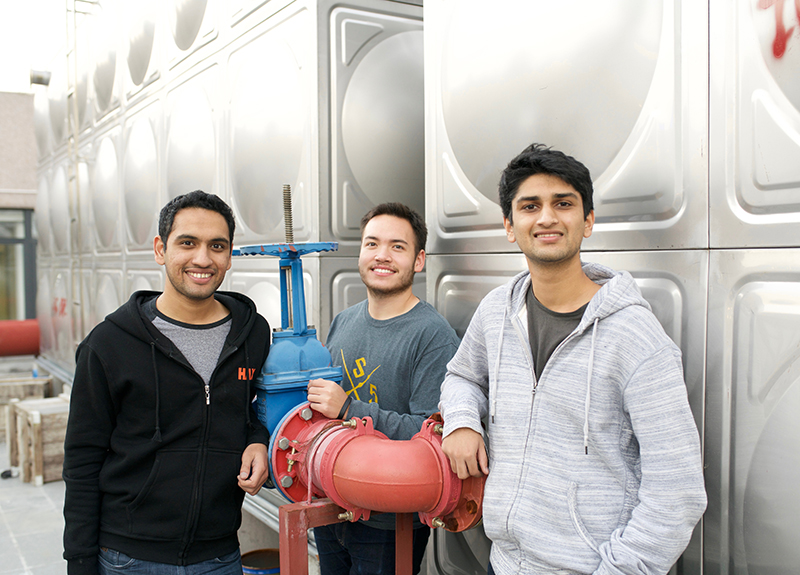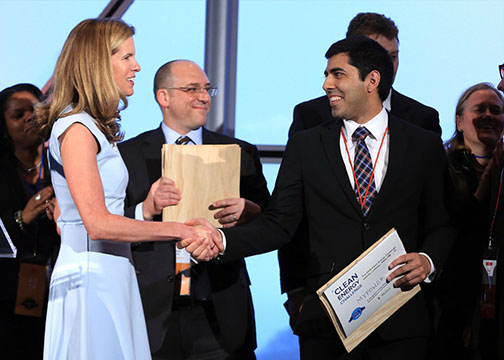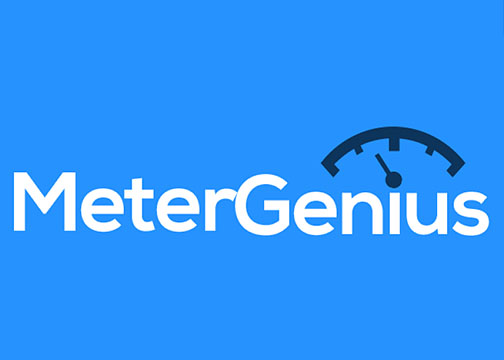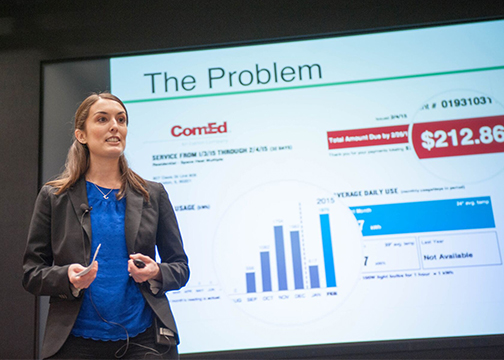When Northwestern student Akshat Thirani moved off campus his junior year, he discovered just how expensive electricity bills could be. Without any knowledge of which appliances were consuming the most energy, Thirani realized that consumers lacked the transparency needed to reduce their energy usage. This led him to lay the foundation for Amper, a startup with a smart circuit breaker that measures electricity usage from specific points so customers can better understand how their appliances are using electricity.
Ready to start building their product, Thirani and fellow computer science majors Sachin Lal (MEAS ’16) and Philip House (MEAS ’15) sought help to create a business model around their technology. They applied to NUvention: Energy, a course organized jointly by the Farley Center for Entrepreneurship and Innovation and the Institute for Sustainability and Energy at Northwestern (ISEN). The course seeks to to provide students with a realistic simulation of the challenges and opportunities that come with creating a business that seeks to both meet a market need and have a positive environmental impact. In class, the team worked with experts from energy companies like Schneider Electric and ComEd to craft their business pitch around homeowners looking to track their home electricity bills.
“As an undergrad you might end up learning just one aspect of startups, like in Amper’s case, the technical aspects of the product,” said Thirani. “NUvention: Energy helped us learn about venture capital and working with utilities. It helped us to flesh out the business.”
With their final class pitch under their belts, Amper went on to compete in the Massachusetts Institute for Technology (MIT) Clean Energy Prize, where they were one of six winners and took home $20,000 toward their idea. Back on campus, The Garage, Northwestern’s 11,000 square foot innovation space, was also influential to Amper’s development as it connected the company to several mentors and provided it with a workspace as well as equipment. When Duncan Turner, the director of HAX, the world’s largest accelerator program, came to Northwestern for a seminar, the team was able to set up a meeting with him. They were invited to join HAX, and spent four months in Shenzhen, China, where the accelerator is based, learning how to make the prototypes, source materials, and design electronics. It was during HAX that they decided to shift their target customers from homeowners to manufacturers.
“Through the program we learned early on that the product of a household smart circuit breaker would take too long to launch in the market because of regulations and barriers,” Thirani said. “So we actually diverted our product from a home energy starter to an industrial monitoring system that monitors machines and other equipment in factories. This way companies can optimally use resources and minimize waste.”
Amper, a modular system, differentiates itself from its other competitors such as Sight Machine and IQMS, two platforms that enable companies to track real-time manufacturing operations with the goal of increasing efficiency and profits, with its ability to be self-installed. This key feature makes Amper accessible to smaller manufacturers who may not be able to invest in capital intensive or complex systems.
“It’s impossible to improve anything you can’t measure,” said Thirani. “By identifying different areas of waste, factories can understand how machines are working and whether they are wasting electricity or breaking down.”
Since finishing the HAX program this past December, Amper is now working with Alchemist Accelerator, a venture-backed business incubator. The team is currently located in San Francisco for the next six months selling Amper to businesses and creating pilots.
“There are so many things you don’t know about startups when you’re a college student,” Thirani said. “I give credit to ISEN and The Garage for helping us in being able to launch a business right out of college.”







